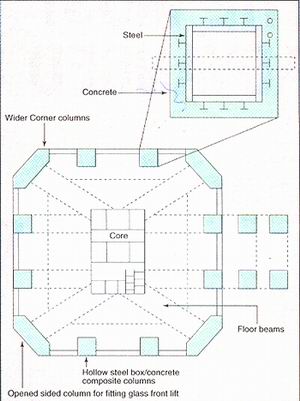|
BUILDING BAIYOKE 2
KEY DATES & EVENTS
Late
1980s
Project conceived by Khun
Panlert Baiyoke.
Early
1991
Official ground breaking.
Foundation works carried
out by Multiplex
RSY Constructions
(Australia). Workers began
to install 360 concrete
piles (driven to 56m depth)
before placing a 5m thick
mat over the top.
November
1992
Concrete Constructions (Thailand)
Ltd took over the project,
work on the superstructure
began. The contractor achieved
1.5 floors per month using
jump forms and pumped concrete,
the construction pace quadruple
to 6 floors per month after
the first 21 floors were
built.
1995
Installation of mechanical
and electrical services.
Completion of
the 19 level parking and
retail podium.
August
1996
Concrete pouring
ceremony on the tower's
85th floor (tower topped out in early 1997).
June
1999
Official opening
of the Baiyoke
Sky Hotel
Other Technical Info
•This building contains
a total 60,000 cubic metres
of cement. Its floor plan
is typically 50m square
plate with corner columns
(one side has open column
for external lift). A 30m
diametre cylindrical plate
begins at the 80th floor.
•Upto 360 piles of
concrete were driven through
clay into thick sand layer
to the depth of over 50m
and sealed with a 5m thick
mat.
 •The
building represents one
of the most sophisticated
uses of concrete in Thailand,
with 60N/sq mm (compressive
strength) concrete forming
the main material for the
columns in a lightweight
composite structure along
with steel box girder reinforcement.
The concrete core is surrounded
by a square pattern of hollow
columns fused together by
key studs with an 200mm
outer layer of 60N high
strength concrete. •The
building represents one
of the most sophisticated
uses of concrete in Thailand,
with 60N/sq mm (compressive
strength) concrete forming
the main material for the
columns in a lightweight
composite structure along
with steel box girder reinforcement.
The concrete core is surrounded
by a square pattern of hollow
columns fused together by
key studs with an 200mm
outer layer of 60N high
strength concrete.
•Columns start solid
at the base and becoming
hollow at the top.

B2 Typical Floor Plate
Civil Engineering International
•The erection of tower
was sped up with the use
of VSL Climbform self-climbing,
modular system for construction
of vertical walls. It is
the first time VSL Climbform
techology was in use in
Thailand.
•Concrete were pumped
to a 300m height level using
Putzmeister
pump (the pump previously
set world record in high-rise
conveying of concrete to
a height of 532 metre during
the construction of the
Riva del Garda dam in Italy).
And from the 300m level
the concrete were lifted
by a Favelle 310D luffing
jib tower crane.
•Baiyoke 2 was the
tallest reinforced concrete
building in the world at
the time of completion in
1997. This record was surpassed
by CITIC
Plaza building
in Guangzhao (China) which
was completed a year later.
•Site testing shows
the building sway to a cycle
of about six seconds. Expert
sources suggested that the
building may have sunk by
40mm during construction
and may have impacted on
the foundations of several
smaller buildings nearby.
•The estimated cost
of the project was put at
around 3.4 Billion Baht
(costed before the devaluation
of the Thai Baht in July
1997).
 •Initial
plans call for a 140m high
communication tower to be
placed on top of the building
(see rendering of the building's
3D model with the proposed
telecom tower on top)
although the developer has
opted for a smaller radio
transmission tower. •Initial
plans call for a 140m high
communication tower to be
placed on top of the building
(see rendering of the building's
3D model with the proposed
telecom tower on top)
although the developer has
opted for a smaller radio
transmission tower.
•Baiyoke 2 was the
world's tallest hotel at
the time it was completed
- but this was never registered
in the Guiness Book of World
Records. The Burj
al Arab Hotel
in Dubai which completed
a year later is currently
the tallest hotel.
SOURCE:
Engineering
News Record Magazine
(June '96)
International Construction
Magazine (Nov
'94)
Civil Engineering International
(May '96)
Engineers Australia Magazine
(Oct '96)
VSL
News (1994)
Bangkok Post Archive
».BH
main
| news
| diagrams
|